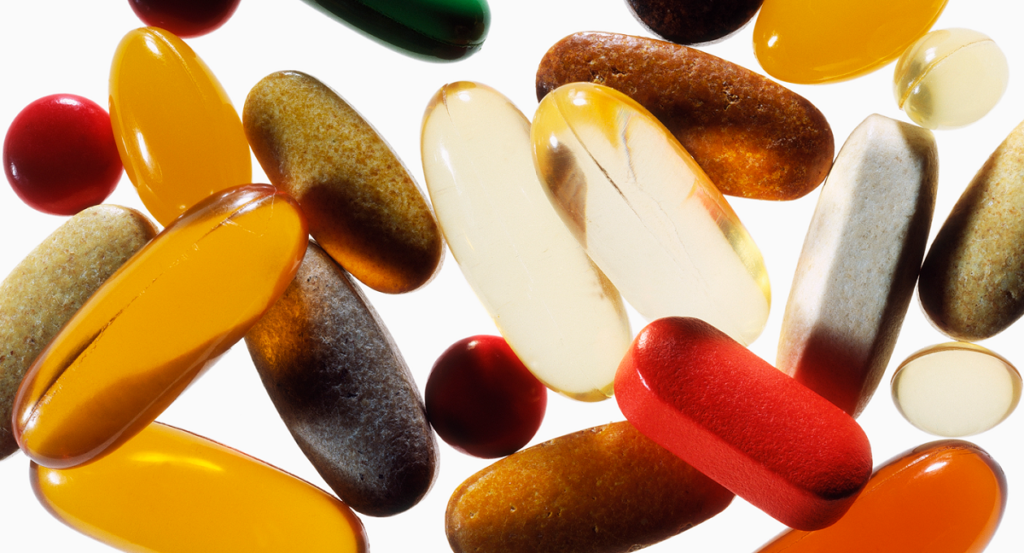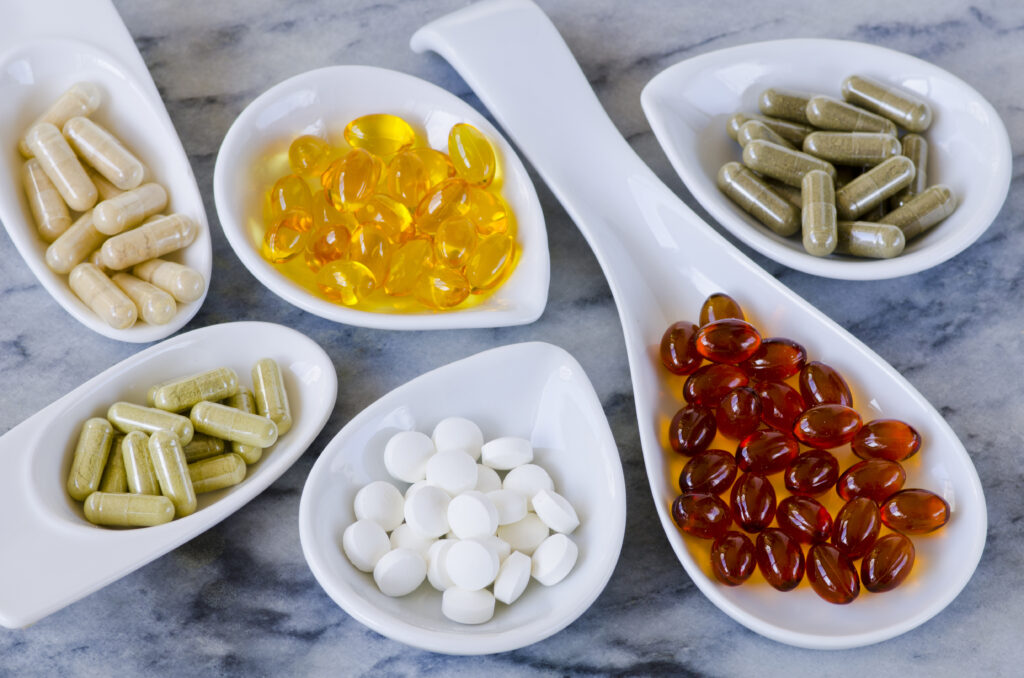Have you ever wondered what exactly goes into those little capsules or tablets that promise to improve your health and wellness? Whether you’re a health enthusiast or simply curious about the world of dietary supplements, it’s important to understand what you’re putting into your body. This article will shed some light on the ingredients commonly found in dietary supplements and their potential benefits, allowing you to make informed choices for your own well-being.

This image is property of www.fda.gov.
Vitamins
Vitamin A
Vitamin A is an essential nutrient that plays a crucial role in maintaining healthy vision, promoting growth and development, and supporting a strong immune system. It is a fat-soluble vitamin that can be found in two forms: retinol and provitamin A carotenoids. Retinol is found in animal products such as liver, eggs, and dairy, while provitamin A carotenoids are found in colorful fruits and vegetables like carrots, spinach, and sweet potatoes.
Vitamin B
The family of B vitamins, also known as B-complex vitamins, consists of eight different vitamins: B1 (thiamin), B2 (riboflavin), B3 (niacin), B5 (pantothenic acid), B6 (pyridoxine), B7 (biotin), B9 (folic acid), and B12 (cobalamin). B vitamins are water-soluble and are involved in various bodily functions, including energy production, red blood cell formation, and maintaining a healthy nervous system. Good dietary sources of B vitamins include whole grains, legumes, leafy green vegetables, meat, fish, and dairy products.
Vitamin C
Vitamin C, also known as ascorbic acid, is a water-soluble vitamin that acts as a powerful antioxidant in the body. It plays a crucial role in collagen synthesis, which is important for maintaining healthy skin, blood vessels, bones, and cartilage. Additionally, vitamin C supports the immune system and helps the body absorb iron. Citrus fruits like oranges, lemons, and grapefruits are rich sources of vitamin C, along with berries, kiwi, and bell peppers.
Vitamin D
Vitamin D is a fat-soluble vitamin that is mainly produced in the body when the skin is exposed to sunlight. It plays a vital role in regulating calcium and phosphorus absorption, which is essential for maintaining strong bones. In addition to sunlight, dietary sources of vitamin D include fatty fish like salmon and mackerel, fortified dairy products, and egg yolks. Vitamin D deficiency can lead to bone disorders such as rickets in children and osteomalacia in adults.
Vitamin E
Vitamin E is a fat-soluble vitamin that functions as an antioxidant, protecting cells from damage caused by free radicals. It plays a role in immune function, DNA repair, and other important processes within the body. Good sources of vitamin E include nuts and seeds, vegetable oils, spinach, and broccoli.
Vitamin K
Vitamin K is a fat-soluble vitamin that is essential for blood clotting and bone health. There are two main forms of vitamin K: vitamin K1 (phylloquinone), which is found in leafy green vegetables, and vitamin K2 (menaquinone), which is produced by bacteria in the gut and also found in animal products. Vitamin K deficiency can lead to excessive bleeding and impaired bone mineralization.
Minerals
Calcium
Calcium is a mineral that is essential for strong bones and teeth, as well as proper nerve function and muscle contraction. It also plays a role in blood clotting and regulating blood pressure. Good dietary sources of calcium include dairy products, leafy green vegetables, and fortified foods.
Iron
Iron is a mineral that is necessary for the production of hemoglobin, a protein found in red blood cells that carries oxygen throughout the body. Iron deficiency can lead to anemia, characterized by fatigue, weakness, and poor concentration. Good sources of iron include red meat, poultry, fish, legumes, and fortified cereals.
Magnesium
Magnesium is a mineral that is involved in over 300 biochemical reactions in the body, including energy production, muscle and nerve function, and regulating blood sugar levels. It is also important for maintaining healthy bones and a strong immune system. Good dietary sources of magnesium include nuts, seeds, whole grains, leafy green vegetables, and legumes.
Zinc
Zinc is a mineral that is involved in numerous enzymatic reactions in the body and plays a critical role in immune function, wound healing, and DNA synthesis. It is also important for the sense of taste and smell. Good sources of zinc include oysters, red meat, poultry, seafood, whole grains, and legumes.
Potassium
Potassium is an essential mineral that is involved in maintaining proper fluid balance, nerve function, and muscle contraction. It also helps regulate blood pressure and supports cardiovascular health. Good dietary sources of potassium include bananas, oranges, potatoes, spinach, and beans.
Selenium
Selenium is a trace mineral that acts as an antioxidant, helping to protect cells from damage caused by free radicals. It also plays a role in thyroid function and immune system health. Good dietary sources of selenium include Brazil nuts, seafood, meat, poultry, and grains.

This image is property of www.efsa.europa.eu.
Herbs and Botanicals
Ginkgo biloba
Ginkgo biloba is an herb that has been used in traditional medicine for centuries. It is believed to have various health benefits, including improving cognitive function, reducing symptoms of anxiety and depression, and supporting eye health. Ginkgo biloba supplements are commonly used to enhance memory and concentration.
Echinacea
Echinacea is an herb that is believed to boost the immune system and help fight off infections, particularly those of the respiratory tract. It is often used as a remedy for the common cold and other upper respiratory infections. Echinacea supplements come in various forms, including capsules, tablets, and liquid extracts.
Ginseng
Ginseng is a popular herb that is commonly used in traditional Chinese medicine. It is believed to have various health benefits, including boosting energy, reducing stress, improving cognitive function, and enhancing immune function. Ginseng supplements are available in different forms, including solid extracts, powders, and teas.
Garlic
Garlic has been used for centuries for its potential health benefits. It is believed to have antibacterial and antifungal properties, support cardiovascular health, and boost the immune system. Garlic supplements are available in various forms, including capsules, tablets, and oils.
Saw palmetto
Saw palmetto is an herb that is commonly used to support prostate health and relieve symptoms of an enlarged prostate, such as frequent urination and weak urine flow. It is often used as a natural alternative to prescription medications. Saw palmetto supplements are available in different forms, including capsules, tablets, and liquid extracts.
Amino Acids
L-arginine
L-arginine is an amino acid that is involved in various physiological processes, including the production of nitric oxide, which helps relax blood vessels and improve blood flow. It is often used as a supplement to support cardiovascular health, athletic performance, and erectile function.
L-glutamine
L-glutamine is an amino acid that is essential for the proper functioning of the immune system and the maintenance of intestinal health. It is commonly used as a supplement to support gut health, aid in muscle recovery, and boost immune function.
L-carnitine
L-carnitine is an amino acid that plays a role in energy production and the metabolism of fats. It is often used as a supplement to support weight loss, enhance athletic performance, and improve cognitive function.
Tryptophan
Tryptophan is an essential amino acid that is a precursor to serotonin, a neurotransmitter that regulates mood, appetite, and sleep. It is commonly used as a supplement to promote relaxation, improve mood, and alleviate symptoms of depression and anxiety.

This image is property of image.slidesharecdn.com.
Enzymes
Digestive enzymes
Digestive enzymes are substances that help break down food into smaller molecules so that they can be absorbed and utilized by the body. They support healthy digestion and nutrient absorption. Common types of digestive enzymes include amylase, protease, and lipase.
Proteolytic enzymes
Proteolytic enzymes, also known as proteases, are enzymes that help break down proteins into smaller peptides and amino acids. They are commonly used as supplements to support healthy immune function, reduce inflammation, and promote faster recovery from sports injuries.
Metabolic enzymes
Metabolic enzymes are involved in various metabolic processes within the body, including energy production, detoxification, and hormone regulation. They play a crucial role in maintaining overall health and vitality. Metabolic enzyme supplements are often used to support healthy aging, improve digestion, and enhance nutrient absorption.
Probiotics
Lactobacillus acidophilus
Lactobacillus acidophilus is a beneficial bacteria that is naturally found in the gastrointestinal tract. It helps maintain a healthy balance of gut flora and supports digestive health. Lactobacillus acidophilus supplements are commonly used to help restore and maintain a healthy gut microbiome.
Bifidobacterium bifidum
Bifidobacterium bifidum is another type of beneficial bacteria that is naturally found in the gut. It plays a role in maintaining a healthy digestive system and supporting immune function. Bifidobacterium bifidum supplements are commonly used to improve gut health and support overall well-being.
Saccharomyces boulardii
Saccharomyces boulardii is a beneficial yeast that is often used as a probiotic to support gastrointestinal health. It has been shown to help reduce the risk of antibiotic-associated diarrhea and support the balance of gut flora. Saccharomyces boulardii supplements are available in capsule or powder form.

This image is property of www.nia.nih.gov.
Fatty Acids
Omega-3 fatty acids
Omega-3 fatty acids are a type of polyunsaturated fat that is essential for overall health. They are known for their anti-inflammatory properties and have been shown to support cardiovascular health, brain function, and joint health. Good dietary sources of omega-3 fatty acids include fatty fish like salmon, mackerel, and sardines, as well as walnuts and flaxseeds.
Omega-6 fatty acids
Omega-6 fatty acids are another type of essential polyunsaturated fat that plays an important role in brain function and regulating inflammation. They are found in various vegetable oils, nuts, and seeds. However, it is important to maintain a proper balance between omega-3 and omega-6 fatty acids, as an excessive intake of omega-6 fatty acids can contribute to inflammation.
Omega-9 fatty acids
Omega-9 fatty acids are monounsaturated fats that are not considered essential because the body can produce them on its own. However, consuming foods that are rich in omega-9 fatty acids, such as olive oil, avocados, and nuts, can still provide health benefits. Omega-9 fatty acids have been shown to support heart health, reduce inflammation, and improve insulin sensitivity.
Antioxidants
Beta-carotene
Beta-carotene is a carotenoid that is converted into vitamin A in the body. It acts as an antioxidant, helping to protect cells from damage caused by free radicals. Beta-carotene has been shown to support eye health, enhance immune function, and promote healthy skin. Good dietary sources of beta-carotene include carrots, sweet potatoes, spinach, and kale.
Vitamin C
Vitamin C, as mentioned earlier, is a potent antioxidant that helps protect cells from free radical damage. It is known for its immune-boosting properties and is involved in collagen synthesis. In addition to citrus fruits, other good sources of vitamin C include strawberries, kiwi, bell peppers, and broccoli.
Vitamin E
Vitamin E, also mentioned previously, is a fat-soluble antioxidant that helps protect cell membranes from damage caused by free radicals. It has been shown to support cardiovascular health, promote healthy skin, and strengthen the immune system. Good dietary sources of vitamin E include nuts and seeds, vegetable oils, spinach, and broccoli.
Selenium
Selenium, as mentioned earlier, is a trace mineral that acts as an antioxidant in the body. It works synergistically with other antioxidants to combat oxidative stress and support overall health. Selenium has been shown to support thyroid function, boost immune function, and reduce the risk of certain diseases. Good dietary sources of selenium include Brazil nuts, seafood, meat, poultry, and grains.
Coenzyme Q10
Coenzyme Q10, also known as CoQ10, is a naturally occurring antioxidant that is involved in energy production within cells. It is important for cardiovascular health, as it helps support the proper functioning of the heart muscle. CoQ10 supplements are often used to support heart health, promote energy production, and reduce the side effects of certain medications.

This image is property of d2jx2rerrg6sh3.cloudfront.net.
Fiber
Soluble fiber
Soluble fiber is a type of fiber that dissolves in water, forming a gel-like substance in the digestive tract. It helps regulate blood sugar levels, lower cholesterol levels, and support a healthy gut microbiome. Good sources of soluble fiber include oats, barley, legumes, fruits, and vegetables.
Insoluble fiber
Insoluble fiber, on the other hand, does not dissolve in water and adds bulk to the stool, promoting regular bowel movements and preventing constipation. It also helps maintain a healthy digestive system and may reduce the risk of certain diseases, such as colon cancer. Good sources of insoluble fiber include whole grains, nuts, seeds, and the skin of fruits and vegetables.
Other Ingredients
Fillers
Fillers are non-nutrient ingredients that are added to dietary supplements to fill up space in capsules or tablets. They are often used to improve the appearance and stability of the product. Common fillers include cellulose, magnesium stearate, and silica. While fillers are generally safe for consumption, some individuals may have allergies or sensitivities to certain fillers.
Binders
Binders are ingredients that help hold the ingredients of a dietary supplement together. They are often used in tablet formulations to ensure that the tablet remains intact and does not crumble. Common binders include starches, gums, and cellulose derivatives.
Flavorings
Flavorings are added to dietary supplements to enhance the taste and make them more palatable. They can be natural or artificial and are used to mask the unpleasant taste of certain ingredients. Common flavorings include fruit extracts, herbs, and sweeteners.
Sweeteners
Sweeteners are added to dietary supplements to make them taste sweet without adding calories. They can be natural or artificial and are used to enhance the flavor and appeal of the product. Common sweeteners include stevia, erythritol, and sucralose.
Colorings
Colorings are added to dietary supplements to give them an attractive appearance. They can be natural or artificial and are used to enhance the visual appeal of the product. Common colorings include vegetable extracts, fruit juices, and synthetic dyes.
In conclusion, dietary supplements contain a wide range of vitamins, minerals, herbs, botanicals, amino acids, enzymes, probiotics, fatty acids, antioxidants, fiber, and other ingredients. These components play various roles in maintaining overall health and supporting specific bodily functions. It is important to choose high-quality supplements from reputable brands and consult with a healthcare professional before starting any new supplementation regimen. Remember, dietary supplements should not be used as a substitute for a balanced diet and healthy lifestyle.
